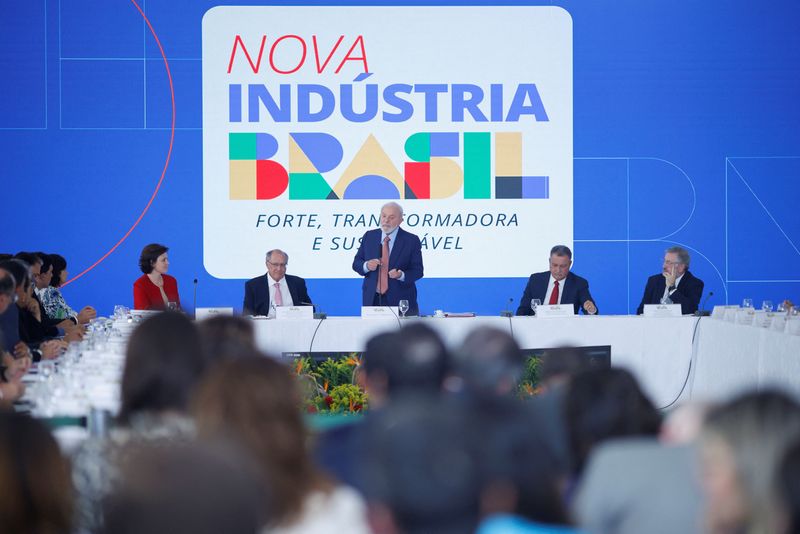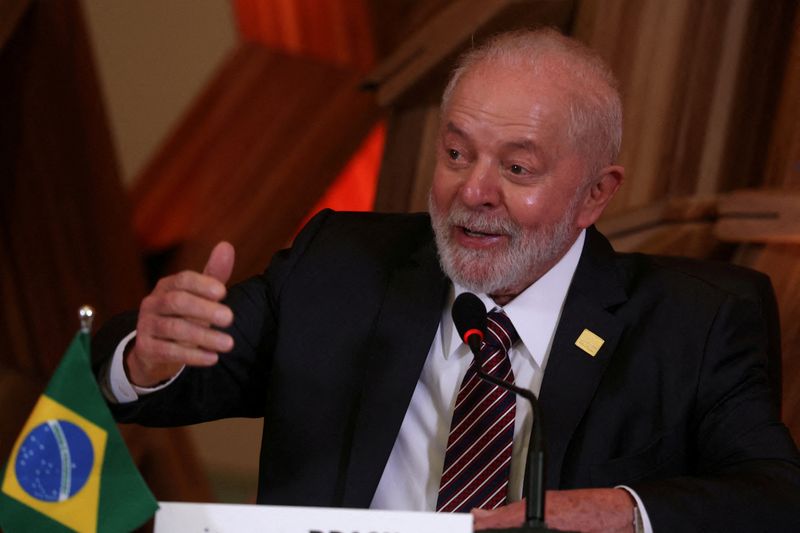By Bernardo Caram
BRASILIA (Reuters) -Investors sold Brazil's real currency on Monday after leftist President Luiz Inacio Lula da Silva unveiled an industrial development plan for the next 10 years aimed at boosting sluggish growth with state credits and subsidies.
Lula wants to boost long-lagging growth with a similar playbook to the one he used during his 2003-2010 presidential terms. Yet those efforts were ultimately undermined by falling commodities prices and a sprawling corruption scandal that landed Lula in jail until his convictions were overturned.
"For once and for all, we need to overcome the problem of Brazil always being on the verge and but never quite becoming a developed country," Lula said at the program's launch.
Investors were less bullish.
Shortly after the announcement, the Brazilian real accelerated its decline against the U.S. dollar, as investors saw the plan as a risk factor for the country's fiscal health. Brazil's real ended trading down 1.2% on Monday.
"The program could lead to expenses for the government and the market is adjusting, looking to the dollar for protection," said Jefferson Rugik, director of brokerage Correparti.
The National Development Bank BNDES said it has earmarked 250 billion reais ($50 billion) in funds for Lula's plan, with another 50 billion reais coming from other state sources.
Lula has called the plan a "re-industrialization" effort to change policies that focused on agricultural production and exports by Brazil, a major global food producer, at the expense of national industry during the administration of his hard-right predecessor Jair Bolsonaro.
The boost for local industry comes as the Brazilian economy, Latin America's biggest and among the world's 10 largest, has begun to show signs of cooling this year.
The economy will decelerate to 1.6% growth in 2024 from 3.0% in 2023, according to the median forecast of 50 economists polled by Reuters from Jan. 8-18. Forecasts for 2025 are showing 2% growth.
The government said sustainable financial instruments and credit for innovation, infrastructure and exports will be prioritized, in addition to subsidies, such as tax incentives.
The government is also planning a requirement for local content for public purchases under its restored Growth Acceleration Program (PAC), as well as for low-cost housing and school transport programs.
The plan also seeks to prioritize public infrastructure works, which "play an important role for industrial development," the government said in a statement.

"To reverse the country's early de-industrialization, the new policy foresees the articulation of several state instruments, such as special credit lines, non-refundable resources, regulatory and intellectual property actions, in addition to a public works and procurement policy, with incentives for local content," it said.
($1 = 4.9526 reais)
